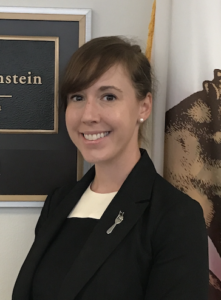Rheumatologist Christina D. Downey, MD, assistant professor of medicine at Loma Linda University School of Medicine, Calif., just became the new chair of the ACR’s Committee on Government Affairs (GAC). She has been a member of the committee since she was a rheumatology fellow and most recently served as the committee’s liaison with the Committee on Rheumatologic Care (CORC).

Dr. Downey
Dr. Downey’s choice to specialize in rheumatology came after exploring a rather circuitous route of alternatives. She first wanted to specialize in psychiatry. Majoring in neurobiology as an undergraduate, she then thought she might become a brain surgeon. “And then I scrubbed in on my first surgery and said, ‘absolutely not—no surgery for me!’” An intensive care rotation was not a match either. When she “found” rheumatology, she was immediately taken with the complexity of rheumatic diseases and the ability to make a difference in her patients’ lives. The longevity of the physician-patient relationship is also a draw, she notes.
In her three-year term as GAC chair, Dr. Downey will support the committee’s work on developing effective liaisons with governmental and nongovernmental research support agencies, including active engagement with congressional members and ACR staff on issues related to healthcare delivery, financing and reimbursement.
A Difference over Time
Dr. Downey became involved in advocacy early in her career as a participant in the inaugural class of the Advocacy 101 program. This training program, which started in 2015, was originally proposed by William F. Harvey, MD, MSc, FACR, clinical director of the Arthritis Treatment Center, Tufts Medical Center, Boston, and advanced by Sarah M. Doaty, MD, FACP, director of the Division of Rheumatology, Alaska Native Tribal Health Center, Anchorage, and Elizabeth “Blair” Solow, MD, associate professor of medicine, UT Southwestern Medical Center, Dallas, and immediate past chair of GAC. Since that first experience in Advocacy 101, Dr. Downey has volunteered with the ACR in numerous leadership and advocacy roles, including helping to lead Advocacy 101 and serving as a member of the ACR’s delegation to the American Medical Association House of Delegates.
Dr. Downey’s attraction to the GAC stemmed from her realization that government policies can have a direct effect on both patient care and the practice of rheumatology. She worries that some rheumatologists may eschew engaging with policy advocacy due to a misperception that it means delving into “the dirty business” of politics. She wants to dispel this myth: As policy advocates, she says, physicians play a vital role in explaining to policymakers how policies and laws affect patients and the profession. Otherwise, she says, government officials “will be making decisions based on erroneous information.”
Antidote to Burnout
Dr. Downey sees added value to advocacy beyond its importance to the field. “I would say that involvement with government affairs is an antidote to burnout,” she says. “You may not see a difference in policy after one visit to the Capitol or one letter to your representative, but over the years, we do see differences.”
During her first Capitol Hill visit as part of the Advocacy 101 program, for example, the goal was to secure repeal on therapy caps for Medicare patients. The effort was successful, and the days of rationing physical therapy for Medicare patients are a thing of the past. “So we do make a difference over time,” Dr. Downey concludes.
Serving on the GAC and engaging in advocacy represents “tapping into a higher sense of purpose,” she notes. “Being able to care for patients in a broader way [through advocacy] really adds to my own self-efficacy and sense of purpose. It’s definitely soul-recharging.”
Plans for the Committee
Dr. Downey’s first goal as GAC chair is to learn as much as she can from Dr. Solow, the outgoing chair, as well as access the expertise and knowledge of the committee members and ACR staff. She then intends to devote some of the committee’s focus to the issue of reimbursements for ultrasounds done by rheumatologists.
“We’ve recently suffered a pay cut for reimbursement for these services,” she says. Investment in the machines and supplies is costly, but point-of-care ultrasounds offer both a cost savings to the healthcare system and a boon for patients, she points out.
“This is very patient-friendly because we don’t have to refer them out for an MRI, and patients can get answers in real time rather than having to make a follow-up appointment,” she says. “Getting a return on reasonable reimbursement for scans done in the rheumatology clinic is high on my list of priorities.”
To achieve that goal, Dr. Downey is ready to take a long view and be persistent. From her advocacy experiences to date, she says, she’s learned that “everything is in flux, and just because the winds are not in your sails this term, that doesn’t mean that they won’t be next time.”
Gretchen Henkel is a health and medical journalist based in California.

